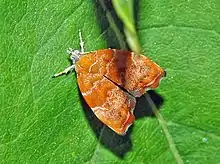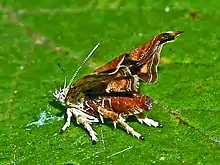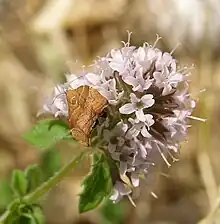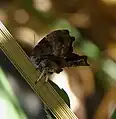Choreutis nemorana
Choreutis nemorana, the fig-tree skeletonizer moth or fig leaf roller, is a species of moth of the family Choreutidae.[1]
| Choreutis nemorana | |
|---|---|
 | |
| Dorsal view | |
 | |
| Ventral view | |
| Scientific classification | |
| Domain: | Eukaryota |
| Kingdom: | Animalia |
| Phylum: | Arthropoda |
| Class: | Insecta |
| Order: | Lepidoptera |
| Family: | Choreutidae |
| Genus: | Choreutis |
| Species: | C. nemorana |
| Binomial name | |
| Choreutis nemorana (Hübner, [1799]) | |
| Synonyms | |
|
List
| |
Description
Choreutis nemorana has a wingspan of 16–20 mm. The basic color of the forewings varies from reddish brown to ocher brown, with whitish markings. The hindwings are brownish, with two pale brown dots on the edge.
Adults overwinter and appear in early spring. The larvae feed on fig leaves.[2] They are protected by a web of silken threads. Adults of the summer generation emerge in July. The second generation emerges in autumn and hibernate.
The species is considered a minor pest, causing distortion of the leaves and discoloration, scarring and tattering.
 Choreutis nemorana
Choreutis nemorana The underside of the hind wings
The underside of the hind wings Mounted adult
Mounted adult Larva under webbing
Larva under webbing Larva exiting web shelter
Larva exiting web shelter
Distribution
This species is widespread from the Canary Islands and Madeira, through the Mediterranean Region and North Africa to Asia.[3] In 2009, it was first recorded in Belgium. It has since established colonies in the east and is expected to spread to the west.[4]
References
- Alford, D. V. (10 April 2007). Pests of fruit crops: a color handbook - D. V. Alford - Google Boeken. ISBN 9780123736765. Retrieved 31 October 2020 – via Google Books.
- Ellis, W N. "Choreutis nemorana (Hübner, 1799) fig-leaf skeletonizer". Plant Parasites of Europe. Retrieved 31 October 2020.
- "Choreutis nemorana (Hübner, 1799)". Fauna Europaea. Retrieved 31 October 2020.
- De Prins, Willy; Baugnée, Jean-Yves; Spronck, René; Spronck, Raphaël (2014). "Choreutis nemorana (Lepidoptera: Choreutidae) well established in Belgium". Phegea. 42 (2): 29–32. ISSN 0771-5277. Retrieved 31 October 2020.